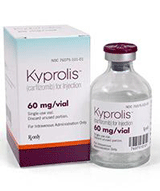The multiple myeloma market already had a couple of meds with third-line nods when the FDA decided to throw a surprise approval into the mix. Can brand-new Farydak from Novartis ($NVS) actually put up a roadblock for Amgen's ($AMGN) Kyprolis and Celgene's ($CELG) Pomalyst? That remains to be seen.
The just-approved blood cancer fighter scored its FDA win last week, grabbing an OK for use alongside Takeda's blockbuster Velcade and the anti-inflammatory dexamethasone. In granting the green light, regulators went against the recommendations of an advisory committee, which last year voted 5-2 against approval because of safety concerns.  Instead, the FDA slapped on a black-box warning that details Farydak's risk of severe and fatal cardiac side effects. And it's there that Kyprolis and Pomalyst have an obvious advantage.
Instead, the FDA slapped on a black-box warning that details Farydak's risk of severe and fatal cardiac side effects. And it's there that Kyprolis and Pomalyst have an obvious advantage.
Yes, Farydak has proven effective at stopping myeloma in its tracks. In a trial of 193 relapsed multiple myeloma patients, the group treated with Farydak along with Velcade and dexamethasone lived for a median 10.6 months without their cancer progressing. That's compared with 5.8 months for those taking Velcade and dexamethasone alone.
But Amgen has its own PFS data that trounced Velcade. Earlier this week, the California biotech announced interim study results showing that patients on Kyprolis and dexamethasone lived for a median 18.7 months without their disease worsening--nearly twice as long as the 9.4 months Velcade charted. And Kyprolis comes without Farydak's safety worries.
Both drugs will be chasing after Pomalyst, which raked in $679.7 million in 2014. Kyprolis brought in less than half that haul--$306 million--a tally that has some investors wondering why Amgen shelled out $10.4 billion in 2013 to buy the treatment's maker, Onyx Pharmaceuticals.
If the new Velcade head-to-head data can help Kyprolis win an indication for earlier use, though, that could silence Amgen's critics. The company is looking to eventually bag a first-line nod, which would open access to larger patient pools and lengthen the duration of therapy.
- read more on the Farydak approval in FierceBiotech
Special Reports: Top 20 orphan drugs by 2018 - Kyprolis - Velcade | The top 10 most expensive drugs of 2013 - Pomalyst - Celgene